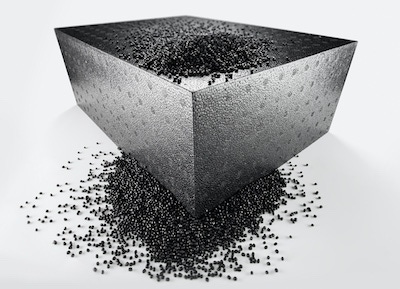March 12, 2020

BASF has further extended its Neopolen range of expanded polypropylene foam (EPP). Compared to the available grades, Neopolen P 9235+ offers improved surface properties, a color impression deepened by 20% and optimized filling behavior in the molding process.
|
Improved visual attributes widen the applicability of EPP foam to include visible components. Image courtesy of BASF. |
Further, parts made of Neopolen P 9235+ generate considerably less friction noise. This is an attractive attribute for quiet-running electric vehicles.
The black particle foam is suitable for automotive parts and dunnage trays subject to impact stress as well as for constructive and protective applications in heating, ventilation and air conditioning systems. Neopolen P 9235+ is listed in the automotive industry’s IMDS material data system and available in Europe immediately. The new standard grade will gradually replace the well-established Neopolen P 9235 and is to evolve into a new product family including specialty grades in the medium term.
Neopolen P 9235+ enables high-quality, smooth surfaces which is an advantage for visible components such as trunk liners in cars. The improved color depth, by 20%, was proven in tests: the special laboratory unit simulates human color perception according to the CIE 1931 color system of the International Commission on Illumination and thus offers an objective and verifiable color result. Further applications of the new particle foam grade include automotive parts such as bumper cores, headrests and armrests. It also serves as housing insulation for heat exchangers and heating units.
Neopolen P 9235+ boasts high energy absorption and low weight, good resilience following static and dynamic loading, and an essentially unchanged energy absorption after repeated impact load. The new grade is resistant to chemicals and oils, thermally insulating and has a low water uptake. The foam particles are available as packaged goods or as loose bulk.
Neopolen is a recyclable EPP consisting of expanded, mainly closed-cell foam particles free from chemical blowing agents. Converters foam the beads into form parts with high freedom in design and geometry for the use in various industries. A molded density between 20 and 110 kg/m³ can be achieved with the standard product range. The foam beads are manufactured and processed without CFCs. Components made of Neopolen can be reused in a variety of ways.
About the Author(s)
You May Also Like





